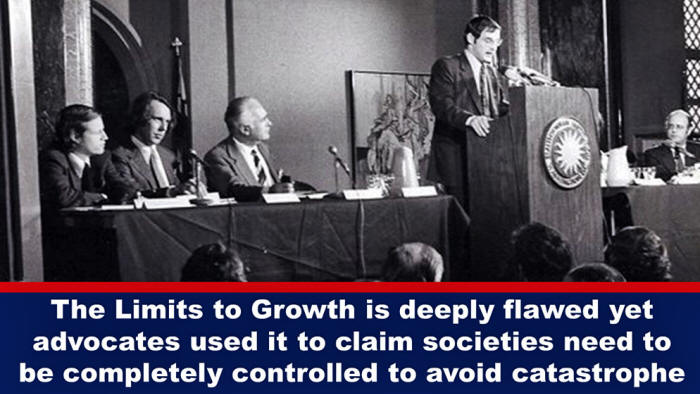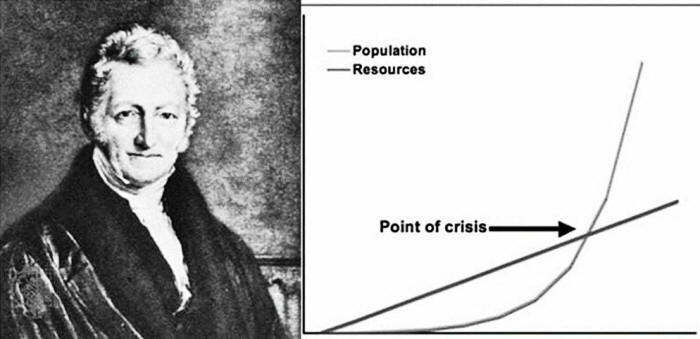|
Dennis Meadows presenting The Limits to Growth c.1972. Source: Is it Too Late for Sustainable Development? Smithsonian, 15 March 2012
However, the models used to make those predictions were deeply flawed and based on pre-conceived outcomes rather than any solid data.
Below is a short extract from the Thames Television documentary highlighting comments by,
The narrator summed up The Limits to Growth:
Dennis Meadows said:
Alexander King said:
Classic News: Club of Rome: Global Reset / Planned Revolution, 5 May 2022
You can watch the full documentary far below...
According to former intelligence officer Dr. John Coleman, the Club of Rome is a servant body of the Committee of 300.
The Committee of 300, also known as The Olympians, goes back to the German politician Walter Rathenau (1870-1922), the Weimar Republic's Foreign Minister in the early 1920s.
He purportedly said:
In a 1909 article, "Geschäftlicher Nachwuchs", in the Viennese Neue Freie Presse he wrote,
In his 1991 book "Conspirators' Hierarchy - The Story of The Committee of 300", Dr. Coleman describes King as,
King and Strong are both named on Dr. Coleman's list of past and present members of the Committee of 300.
Regarding the report The Limits to Growth authored by Jay Forrester and Dennis Meadows for the Club of Rome, Dr. Coleman wrote:
From Malthus to The Limits of Growth
According to historian F. William Engdahl,
The Limits to Growth - a deeply flawed report commissioned by the neo-Malthusian Club of Rome - was published on 2 March 1972.
The Limits to Growth wasn't the first publication based on a model connecting population and resources.
It may have been the first computer model and the first to fuse global temperature with variables like population growth, resource loss, and the under-defined category of "pollution" - but it was not the first model connecting resources to population growth to then be used to justify the culling of the unfit and overpopulated useless eaters.
Today world organizations such as the United Nations Population Fund acknowledge that the debate over how many people the Earth can support effectively started with Thomas Malthus (1766-1834).
Malthus was a professor at the British East India Company (BEIC) training college and is best known for his pessimistic but highly influential views on population growth.
Malthus's position at the college gave his theories considerable influence over Britain's administration of India through most of the 19th century.
The most significant result of this influence was the official response to India's periodic famines: the famines were regarded as necessary to keep the "excess" population in check.
Incidentally, Dr. Coleman noted in his 2008 book 'The Club of Rome' that the BEIC is today known as The Committee of 300.
In 'An Essay on the Principle of Population', first published in 1798, Malthus made the famous prediction that population would outrun the food supply, leading to a decrease in food per person.
He even went so far as to specifically predict that this must occur by the middle of the 19th century, a prediction which failed for several reasons, including his use of static analysis, taking recent trends and projecting them indefinitely into the future, which often fails for complex systems.
Despite the flaws in his model, Malthus wrote:
As BEIC's star economist, Malthus promoted the mathematical thesis that population levels will always tend towards geometric growth, while agricultural resources will tend to arithmetic growth resulting in relatively forecastable "crisis points".
Malthus and his disciples, known as "Malthusians", believed that,
Thomas Malthus and the geometric ratio which he supposedly "discovered" proving that agriculture grows arithmetically while human populations grow geometrically. Source: Unlimited Hangout
According to Malthus, only,
...could check excessive population growth.
Malthus' theories of population were repackaged as the system of eugenics advocated by Sir Francis Galton (cousin to Charles Darwin), Sir Julian Huxley (president of the British Eugenics Society) et al.
Malthus's theory served as the basis of Darwin's interpretation of natural selection.
This, in turn, served as the basis of Galton's theory of eugenics and Herbert Spencer's theory of social Darwinism (ultimately a more 'hands off' approach to weeding out the unfit in a race for diminishing returns).
Malthus gave no proof of his assertion that population increased exactly in geometric progression and food production increased exactly in arithmetic progression (a straight line).
It has been rightly pointed out that population and food supply do not change in accordance with these mathematical series.
And Malthus denies, for example, creative reason; human ingenuity does not follow a straight line.
Malthus, in later editions of his book, did not insist on these mathematical terms and only held that there was an inherent tendency in population to outrun the means of subsistence.
Despite this admission, his modern followers, such as the Club of Rome, have revived and popularized his theory by simply taking his formula and adding more variables.
Regardless of how many variables neo-Malthusians add to their predictive models to make them appear scientific, data sets can be easily cherry-picked, skewed and reframed according to the desired outcome of the computer programmers.
Have things changed in the last 50 years?
Bear all of the above in mind while watching the video below published by The Club of Rome in which Meadows and others reflect on 50 years since the report's publication.
We have embedded the video to begin with Meadows' 10-minute presentation.
Meadows appeared to be admitting his 1972 study was deeply flawed while at the same time holding firmly onto his beliefs that he was right. Yes, he comes across as confused.
Meadows said the scenarios in The Limits to Growth are not predictions and admits his model is not precise but rather a "useful perspective."
He then said:
The reality, Meadows admits, is decline.
But, he says,
...which indicates there is a growth problem.
There seems to be an obvious conflict in his statements.
If so, this is the sort of unscientific mindset that leads to data sets in models being cherry-picked, skewed and reframed according to a desired outcome.
The Club of Rome: The Limits to Growth + 50: Global equity for a healthy planet Anniversary Webinar Series Living within Limits, Episode 1, 4 March 2022
What outcome could the modelers be looking for from their forecasts?
While we don't know the inner workings of their minds, there seems to be a recurring theme throughout the history of these doomsday models which link population size to available resources.
The recurring theme is misanthropy, eugenics and depopulation. To add to the examples already mentioned above, below are a few more.
As noted by F. William Engdahl, in 1974, two years after publishing its "limits" report, the Club of Rome boldly declared:
Then:
In 1991, in a follow-up book to The Limits to Growth, King admitted their use of resources to create a false narrative and reiterated the Club of Rome's misanthropic sentiments:
In 2017, Meadows, one of The Limits to Growth's authors, advocated for the genocide of 86% of the world's population by a global dictatorship:
|



